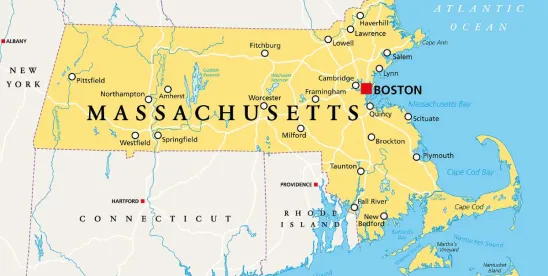Gillette Stadium is widely known as the home of six-time Super Bowl champion New England Patriots. The Patriots, owned by The Kraft Group—a major player in sports and entertainment—began playing at Gillette upon completion of the Stadium in 2002. The Stadium opened on May 11, 2002, though not for a football game. Rather, on that day it was a Major League Soccer team—the New England Revolution— who ceremoniously cut the ribbon for their 2-0 victory against FC Dallas. The New England Revolution—the Revs—are also owned by The Kraft Group.
Since 2006, The Kraft Group’s Founder, Chairman and CEO, Robert Kraft, has looked to find the Revs their own home, but to no avail. Kraft would prefer that the Revs play in a stadium built specifically for soccer and that it be located nearer to its primary fan base in Greater Boston. Most recently, Kraft sought approval to develop a 43.11-acre parcel of land near the Mystic River in Everett for the Revs’ new stadium. Unique to Kraft’s proposed Everett development—in addition to the typical complexities of a large development—is the subject parcel’s classification by CZM, described below, as a Designated Port Area. If not removed, this classification effectively blocks the new stadium.
There was a glimmer of hope for Kraft during Massachusetts’ 2024 legislative session: the State Senate unanimously approved an amendment to a larger economic development bill that would have carved out the proposed stadium site from Everett’s Designated Port Area, thereby removing this obstacle affecting the new stadium. Notably, the legislation would not have altered the remaining portions of land subject to the designation. Yet, despite its support in the Senate, the economic bill failed in conference committee when the House and Senate versions of the bill could not be reconciled.
But what is a Designated Port Area, anyway?
Designated Port Areas (“DPA” or “DPAs”) are identified by 301 CMR 25.00 as:
Geographic areas of particular state, regional, and national significance with respect to the promotion of commercial fishing, shipping, and other vessel-related activities associated with water-borne commerce and the promotion of manufacturing, processing, and production activities reliant upon marine transportation or the withdrawal or discharge of large volumes of water.[1]
DPAs are administered by the Massachusetts Office of Coastal Zone Management, which implements DPA policy, reviews master plans, and establishes and periodically reviews DPA boundaries.[2] Currently, there are eleven DPAs in Massachusetts, including the proposed Mystic River stadium site. DPA designations are intended to protect water-dependent industrial uses on land (or water) that are well situated to facilitate certain operations deemed “significant.” Such uses generally require infrastructure sharing three specifications:
- First, a waterway and corresponding waterfront suited for commercial navigation or other direct water-related uses;
- Second, backland space configured and characterized for siting industrial facilities and operations; and
- Third, land-based transportation and public utility services suitable for general industrial activities.[3]
Thus, while specific DPA uses sought to be protected may differ, certain activities are deemed incompatible with such protections, such as the development of housing, office buildings, or, in this instance, a soccer stadium.[4] Moreover, while there may be a demand for developments otherwise prohibited, lifting DPA restrictions to facilitate general infrastructure development conflicts with the long-recognized public purpose of preserving industrial uses protected by DPAs.
In an instance where a new use did not conflict with the goal of protecting industrial uses, the Salem DPA had been the site of a coal power plant until its demolition in 2014.[5] The former coal plant is being redeveloped as a logistics hub for distributing offshore wind components.[6] Such use conforms with the industrial use characteristics set forth in 301 CMR 25.00 because (1) it is conveniently situated on the waterfront and thereby facilitates direct utilization of the water, (2) it is conducive to industrial activity because it has already been sited and was developed for industrial use and operation, and (3) public utility services and infrastructure are already in place and it is appropriate for general industrial purposes. Thus, while the former Salem coal plant may have otherwise presented an attractive opportunity for new residential or office developments—or even a stadium—the DPA restrictions prioritized a use that would leverage, rather than simply capitalize on, the distinctive characteristics essential to fulfilling the DPA’s central purpose.
Conclusion
While Boston sports fans might enjoy being closer to the action, and Robert Kraft believes the Revs would benefit from a new stadium in Everett, in this instance the DPA’s goal of preserving industrial uses prevailed.
For now, Kraft is headed back to the drawing board and the Revs will stay put at Gillette Stadium.
[1] 301 CMR 25.00, p.2 (https://www.mass.gov/doc/301-cmr-2500-designation-of-port-areas/download).
[2] CZM Port and Harbor Planning Program—Designated Port Areas, Mass.gov (last visited Sept. 30, 2024), https://www.mass.gov/info-details/czm-port-and-harbor-planning-program-designated-port-areas.
[3] Id.
[4] Maggie Sullivan, Setting the Stage for Our Clean Energy Future, Conservation L. Found. (Aug. 10, 2023), https://www.clf.org/blog/designated-port-areas-set-the-stage-for-clean-energy/.
[5] Salem Offshore Wind Terminal, Crowley (last visited Sept. 30, 2024), https://www.crowley.com/wp-content/uploads/sites/7/2023/10/23-05121-Salem-Wind-Terminal-Booklet-UPDATE.pdf.
[6] Id.





 />i
/>i

